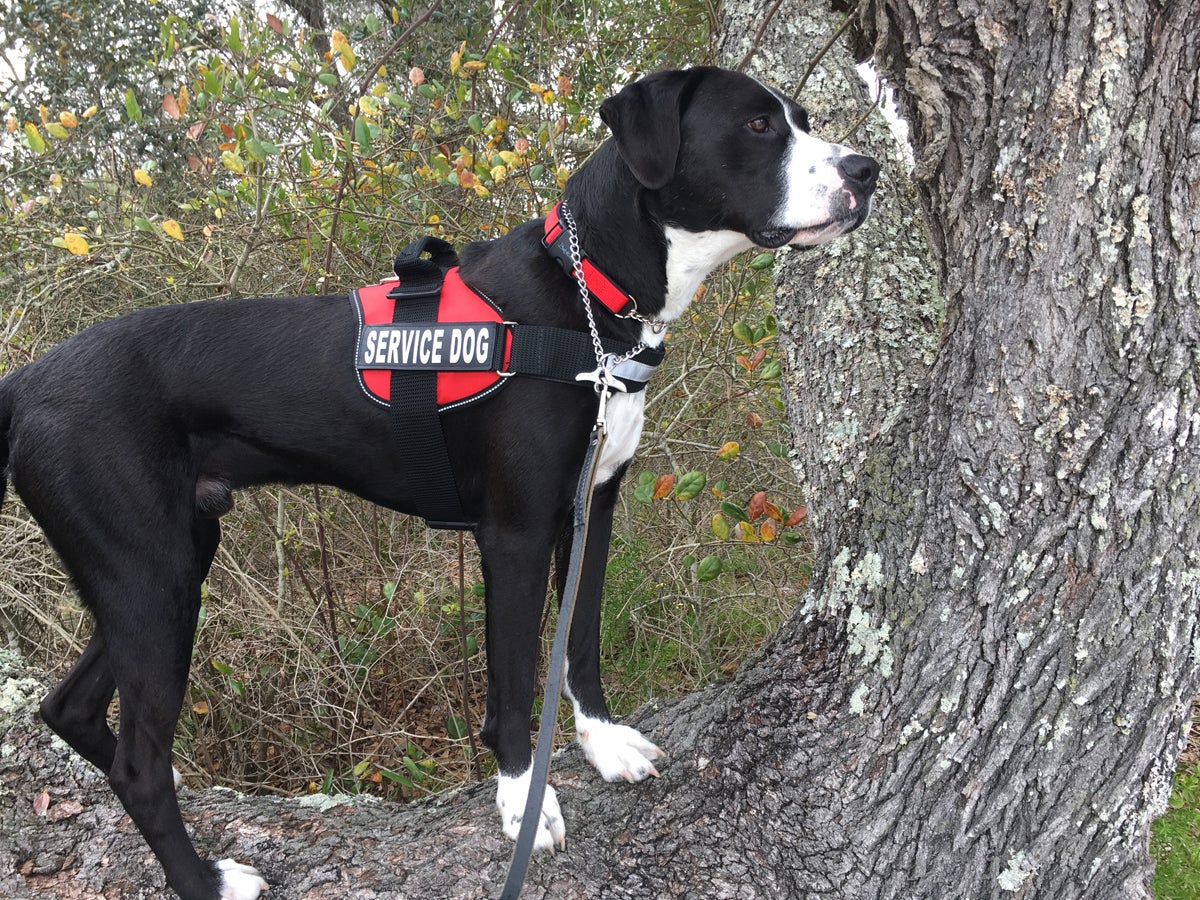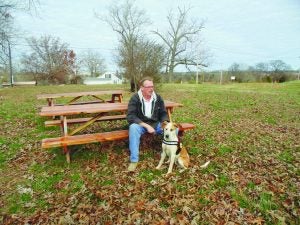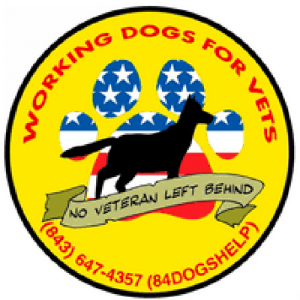Mutts helping vets — Mutts with Manners dogs transitioning over to become members of Working Dogs for Vets
Published 7:00 am Wednesday, December 27, 2017

- (Photo contributed) Zander is a dog from the Boyle County Humane Society shelter and a graduate of Mutts with Manners. After being adopted out and returned to the shelter several times, professional dog trainer, Cheri Carbone, of Danville, realized his intelligence and trained him to become her personal service dog, with the encouragement from Ken Knabenshue, founder of Working Dogs for Vets.
Rebel, a 9-month-old puppy that started his young life behind bars at the Boyle County Animal Shelter and in Northpoint Training Center, is on his way to helping free a veteran from everyday struggles he or she may be experiencing.
But he’s not the first local dog to become a hero with the Working Dogs for Vets program; more than one pup from the local Mutts With Manners has been selected for the specialized training.
Local professional dog trainer Cheri Carbone has been working with the Mutts with Manners program at Northpoint Training Center for several years. Carbone selects older puppies from the Boyle County Humane Society shelter, as well as dogs that may be harder to adopt out because of their age.
In the Mutts program, which usually consists of a class of five dogs at a time, prisoners are taught how to train them with basic obedience commands, making the dog more desirable as family pets.

(Photo contributed)
Cheri Carbone heads up Mutts with Manners, a group which takes shelter dogs to Northpoint Training Facility and works with prisoners to train them.
Later in the 6- to 8-week training period, some teach their dogs “cute tricks, really nothing more than a service dog task,” Carbone said.
A service dog can be useful for some military veterans, especially those suffering fromPost-Traumatic Stress Disorder (PTSD) those who need medication alerts or have severe physical disabilities.
For example, as a “cute trick,” a dog can be trained to open a cabinet door. Or they can learn to pick up a basket and carry it in their mouth, Carbone said. In reality, such tricks can be useful for a veteran’s service dog to know.
When working with the program, Carbone said she occasionally “gets that special personality and you hate to send it (to a regular home.)”
That’s what happened with Rebel, who was recently chosen for the Working Dogs for Vets program and taken to Tennessee about two weeks ago.
“… he was a perfect candidate (to be a veteran’s service dog) because even though he was only a 7-month-old puppy, he walked into the prison like he owned the place. He wasn’t afraid of the tunnels, noises, the guards or even all the guys teaming up around him. He was a solid little guy. His brain was wanting to do something.”
Normally, the Mutts dogs are trained by a prisoner and make great family dogs. “But if there is a dog that has the talent to be a service dog, then I want it going to a service-dog home, not a regular home,” she said.
Sometimes the dog is too much for the family to handle, and they’re sent back to the shelter. Usually, these are the dogs that make great service dogs.
“The smarter the dog, the harder it is for the average person to live with it, but the smarter the dog is, the easier it is to be a service dog.”
Most any dog can learn the basic tasks, Carbone said. The hard part is pinpointing a potential service dog that has the stability to be around other dogs, or walk through stores and not be afraid of anything out in the public.
The Working Dogs for Vets Program trains its talented mutts for up to two years for veterans with PTSD and other disabilities. The dogs are given to the vet at no cost.
Ken Knabenshue, founder of the program in Lawrenceburg, Tennessee — just outside of Nashville — said the program has expanded across the U.S. Right now, he and other professional volunteers for the program are training more than 700 dogs for veterans, and this number grows every year, he said.
But even now, it isn’t even close to being enough trained service dogs for veterans who need them, Knabenshue said.
He estimates that all programs for trained service dogs are running three to four years behind, and a lot of other dog training programs only help veterans who have served in combat.

(Photo contributed)
Ken Knabenshue takes a break while training Rebel with the Working Dogs for Vets program, which he founded. Rebel is a shelter dog from Danville being trained to service a veteran.
“It eliminates a lot of veterans so you’re actually looking at about one and a half million veterans that are waiting for a service dog across this country.”
Most of the veterans don’t have the resources to purchase an extremely well-trained, full-bred dog — which can run between $25,000 to $40,000 — Knabenshue said. “You’ll get a very well-trained dog, but who who has that kind of money laying around?” he said.
Working Dogs for Veterans depends on professional dog trainers across the nation to train dogs, then pair the right dog with the right veteran, then teach the vet to complete his or her own dog’s training. This not only helps the veteran bond with the dog, but also teaches the vet training skills that they can pay forward, Knabenshue said.
“The only thing that keeps this moving is that any veteran that we help train the dog — they have to use what they’ve learned, or even if it’s just giving somebody else a ride back and forth to help them get their dog trained … Pay it forward. Everybody we help is expected to help another veteran somehow.”
“We help the professional trainers learn everything about training the service dog and the regulations. There’s a great benefit to get involved, and it’s the right thing to do,” he said.
In the past, Knabenshue came to Danville and took four other dogs from the Mutts with Manners program Carbone told him had great potential to become worthy service dogs. These special dogs were then given to veterans for free and were taught more service dogs tasks.
Dogs trained at Knabenshue’s home are for people who are more physically handicapped to the point they are not able to help with the training, he said. There are eight dogs, including Rebel, now being trained by him for vets with loss of multiple limbs or severe balance issues due to brain injury.
“If we try to train all the dogs in house, we’d be running about 25 years behind. Rebel’s the one sitting next to me right now,”Knabenshue said. “He’s going to be here a while. He’s pretty good but he’s got a long way to go … He already knows a lot of things and in two or three months he’ll probably know all the basics for PTSD. But if he’s smart enough, we’re going to move him forward for somebody who has more of a handicap or war disability.”
Knabenshue said Carbone noticed Rebel’s potential.
“She’s got pretty good judgment. She’s been around dogs for a while. I ain’t givin’ up anybody’s age, but she’s been around them about as much as I have,” he said and chuckled.

After discussing the Mutts With Manners program with Carbone, Knabenshue said he thinks it would be great if the inmates could continue training a few of the dogs specifically for veterans with PTSD and to be medical alert dogs.
“There’s a few people out at the prison who would love to keep their dog longer and train more for the veterans. It’s just getting through the bureaucracy and showing them (the prison) the funds are there. The prison won’t have no problem, I’ll guarantee it,”Knabenshue said.
Carbone said she doesn’t want to turn Mutts With Manners into a program for just service dog training because it takes more time, which in turn would cause fewer other dogs to be taken out of the shelter and trained for families.
“It would hurt our shelter,” she said.
Carbone agreed with Knabenshue that having two separate dog training programs at Northpoint would be beneficial for the dogs, prisoners and veterans.
Knabenshue said one possibility could be that inmates housed in the veterans dorm could be given the responsibility to train service dogs for other veterans. This could help get more service dogs out in the public, he said.
“It’s good PR, it benefits a veteran, and working with our program, we could even work it where two dogs could stay right there (in this area) out of the program,” Knabenshue said.
Even though veterans are given a free, well-trained dog by volunteers for Working Dogs for Veterans, Knabenshue said it’s expensive to get the dog and veteran settled and working well together.
“A veteran gets the dog for free, yes, but it’s not unusual for us to incur $3,000 to $4,000 or more in travel for food and everything like that for whoever has to go there (to the veteran’s home) for their training period. The more severely disabled the veteran is, the longer you have to be there to make sure the dog is working right.”
Knabenshue explained that a professional dog trainer who volunteers normally goes to whatever state the dog and veteran are living in. The volunteer pays for his or her own travel expenses, lodging and food. There is also the cost of transporting the dog to the location.
Knabenshue said for example, a dog is being trained in Georgia right now, but the veteran it has been paired with lives in Illinois and can’t travel.
“Somebody has to spend two to three weeks in Illinois making sure the veteran knows how to use a service dog. If not, we’ve wasted a year and a half of training,” he said. “Volunteers have limited resources too, and it’s hard to find somebody who wants to go to Illinois in the middle of winter and pay for a hotel and food for two or three weeks to make sure the dog is going to be OK. So that’s where the donations are needed.”
Every time the program has a dog needing to go somewhere, volunteers have to reach out to people and ask if they will help cover the cost, Knabenshue said.
Carbone said Knabenshue hosts events and opens his home for veterans to visit about four times a year to come and meet the available dogs trainers around the area have brought.
“And they try to pair dogs with them. I would love to do that here for them too,” Carbone said.
She said Knabenshue wants to raise money to someday have property and set up its own facility. Carbone said in a larger area, they could train more dogs at a time.
Also, they want to eventually “have a place for the guys to sleep. A lot of veterans can’t afford to fly or travel to Tennessee, especially with their families, and they can’t afford to come and stay somewhere,” she said. So Working Dogs For Veterans is,”trying to get all this stuff donated,” Carbone said.
“I’d like to be able to have that in Danville, some year here shortly, then it would be so much easier for the vets … Danville has such great positioning — not far from Louisville, Indianapolis, Knoxville or Nashville and Cincinnati. We’re sitting centrally located to a lot of places that would be easier for veterans in those bigger areas to travel,” she said.
“Our hope is to talk to the National Guard Armory or even at the fairgrounds and hold something like that there.”
But there would be a lot of details to work out, like how to feed and house all the dogs being trained in this area of the U.S. for veterans to meet and select one that suits their need, she said.
Ken Knabenshue
Knabenshue, who is a veteran himself, said he always loved animals. And when he was injured in a serious wreck after getting out of the Army many years ago, “People were trying to sell me a service dog, and it wasn’t that good of a dog.”
“I wasn’t familiar how to train them, but I knew it could be done,” he said. “So I did some research and trained my own and eventually went and did an apprenticeship with (an association for blind people) and then started going more with other disabilities.”
Knabenshue said he used to train one or two dogs at a time and then donate them.
“But as I got older and couldn’t do construction no more, or had to back down, I started doing more and more, and more trainers started getting involved. Then I started getting calls from other states asking how they could get involved or how they could help and it just keeps growing.”
Plus, Knaenshue said and laughed, “It gives me something to do with my life besides sitting around feeling bad for myself. I’m like every other man in this country — we all don’t ever outgrow the fact that if we don’t have something to do, we will get in trouble.”
Cheri Carbone
Carbone said she got involved with Working Dogs for Veterans program because her son and dad were in the service.
“I know what it means to the guys who actually go and do that … and then come home and get nothing,” she said. “Our politicians live higher on the hog than our guys who actually are putting their lives on the line. They can’t hardly make it week to week on what they get.
“It’s just not right. A lot of them can’t even work. It’s a real hardship on those families, but we don’t hear it. If it was anybody else, any other faction of people, they’d be knocking down walls to get noticed, but they just quietly take it.”
Carbone said she knows her talent is with dogs.
“I’ve been convinced since I was very young there’s a reason my life has always been with the dogs. I think it’s a calling that God expects me to do. It’s my only strong talent, so I have to assume it’s the path I’m supposed to be going down,” she said. “… by doing the dogs in the prison they’re helping the prisoners. And we’re helping the dogs by getting them out of the shelter. … And when I realized the need for veterans, I obviously saw there’s another chance for the dogs to do more by helping the veterans.”
Carbone said she is very proud of this community and some of it’s residents who support the veterans. She explained that she when she notices a good service dog candidate, she doesn’t have the authority to take it out of the Mutts With Manners program and give to the Working Dogs for Veterans.
And there is the $150 adoption fee. She said the humane society has a lot of money invested in every dog at the shelter, and she was torn between how she could send dogs to the veterans program without having to pay for the adoption fee every time she identified a potentially good service dog.
So on her Facebook page right before Christmas, Carbone posted a request if anyone would want to sponsor a dog for a veteran. “A lot of people are really for the veterans and know how bad they are treated,” she said.
And amazingly, Carbone said, more people than she expected called and are willing to sponsor a dog. She said five people have already, “paid for a dog to go to Ken’s as soon as I can find them and train them,” she said.
SO YOU KNOW
To find out more about Working Dogs for Veterans, visit www.workingdogsforvets.org, or check out their Facebook page at Workingdogsforvets
The next training event hosted by Working Dogs for Vets will be April 6 at 2781 Highway 43 N, Lawrenceburg, Tennessee.




